A Feminist Dracula and a Folksy Frankenstein
Classic Stage Company offers two horror essentials, neither of which is very scary.
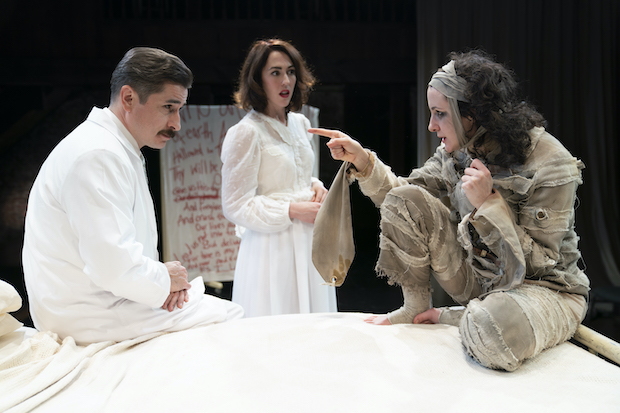
(© Joan Marcus)
You might think that stagings of Bram Stoker's Dracula and Mary Shelley's Frankenstein would be better suited to Halloween, but Classic Stage Company is out to convince you that these two masterpieces of Gothic literature are worth more than cheap frights. This worthy endeavor is only partially successful, and left me wondering if the writers of these new stage adaptations had relinquished a powerful weapon by declining to trigger the fears of their audience — like a vampire hunter leaving her wooden stakes at home.
First there's Kate Hamill's Dracula: English lawyer Jonathan Harker (Michael Crane channeling Michael York) leaves his fiancée, Mina (a perfectly sensible Kelley Curran), to travel to deepest, darkest Transylvania at the behest of his client, Count Dracula (deadly charming and deliciously cruel Matthew Amendt). After centuries of subjugation, the local peasantry are ready to cast off the vampiric aristocrat, so Dracula plans to relocate to England and find new victims, like the beautiful and helpless Lucy (Jamie Ann Romero). Will anyone stand up to Dracula and tell him #TimesUp?
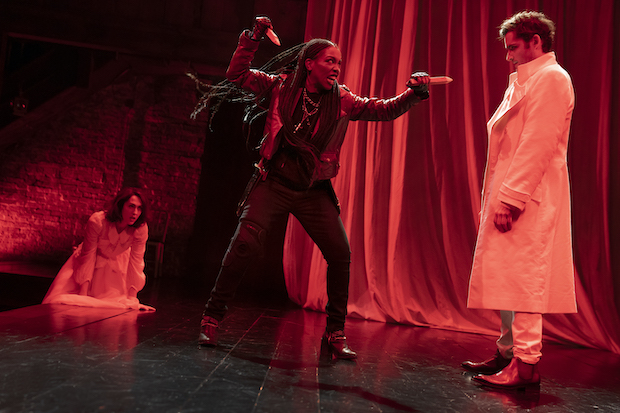
(© Joan Marcus)
Hamill refers to her Dracula as a "feminist revenge fantasy," and there's truth to that: The vampire hunter Doctor Van Helsing (played with steely fortitude by Jessica Frances Dukes) has become a liberal's fantasy of a badass black woman who parachutes in to save the white people from their own ignorance (wearing a cowboy hat and carrying a big knife, she also has elements of the excised character Quincey Morris). Van Helsing doesn't suffer fools, and she has no time for mansplaining.
Asylum director Dr. Seward (a haughty Matthew Saldivar) has become an amalgamation of two men (Lucy's fiancé Arthur Holmwood is out), yet here seems to be worth less than one. He is comically blinkered to the point of irrelevance. It is Mina, rather than Seward, who proves to be a worthy sidekick to Van Helsing. "May I suggest," Mina admonishes the hapless straight white man, "that you stop commanding and start listening." And in response, every woke audience member languidly mouths, "Yaaas, queen," as if attending mass.
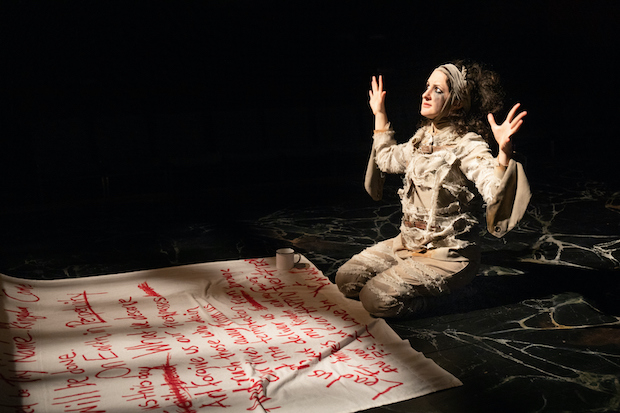
(© James Leynse)
Such fashionable cultural discourse can feel dim onstage, but there are bright spots in Dracula: Hamill has reshaped the role of Renfield for herself to play, and presents her sharpest social commentary through that performance. The zoophagous lunatic is now a deranged lady poet who returns from an ill-fated holiday minus a husband, but plus a new "father" (her term for Dracula). She's such a devoted supplicant that she has rewritten the Lord's Prayer in his honor ("Our father, who art in Earth…"). Her conversion to Draculism has led Renfield to adopt a strident form of feminism that views all husbands as slavers, and rejects marriage entirely (Hamill was coincidentally married during previews for Dracula).
So why, then, is Renfield so happily in thrall to an ageless male vampire? It would seem strange were it not for a strain of feminism that looks to powerful patriarchal institutions (like the state) to protect women from men. Off-Broadway audiences might also be reminded of one of the season's runaway hits, Our Dear Dead Drug Lord, in which a group of young women learn from a macho man drug dealer how to seize their power. And Renfield's delusion seems positively universal when one considers how people of all genders and political stripes now look to ancient male politicians to solve their problems, like surrogate daddies. Hamill's message is clear: The patriarchy contaminates everything, even feminism.
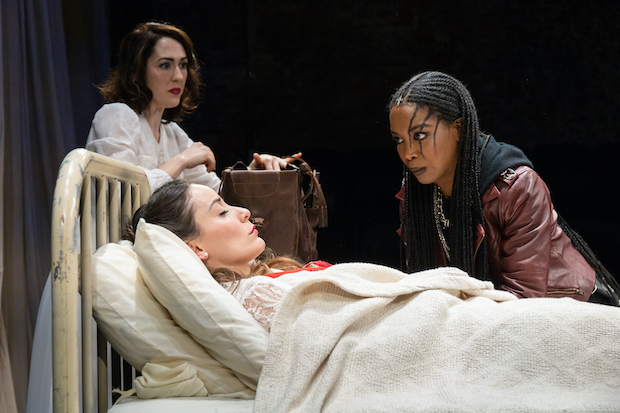
(© James Leynse)
Sarna Lapine directs a sturdy production that is as on-the-nose as Hamill's script: Robert Perdziola's all-white costumes play against the Gothic gloom one expects from Dracula, and provide a perfect canvas for blood splatters. Only Van Helsing resists the whitewashed color palate, dressing instead like a time-traveling grunge rocker (you know, because she thinks differently). Adam Honoré's spooky lighting and Leon Rothenberg's unsettling sound design (bats fluttering, bones crunching) provide the most genuine horror in an evening that often slips into comic melodrama.
Still, Hamill's Dracula is only truly scary in its exposure of pervasive sexism, and the garlicky clichés deployed in its resistance. They may work to repel the vampire temporarily, but stronger stuff will be needed to vanquish him.
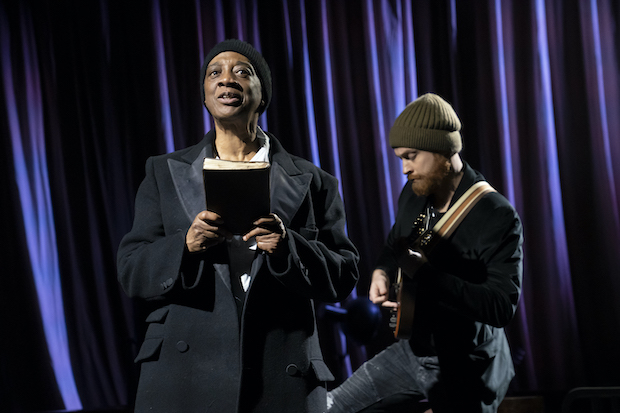
(© Joan Marcus)
Tristan Bernays's Frankenstein is simultaneously less scary, and far more aimless. Despite several powerful aesthetic choices from director Timothy Douglas, it is difficult to discern exactly what Bernays is getting at with this stiff adaptation for two actors, Stephanie Berry and Rob Morrison. Despite the stilted biblical language that Bernays writes for her, Berry manages to bring much humanity to the part of the creature that is brought to life by mad scientist Victor Frankenstein. Morrison plays the latter role, but so does Berry in certain scenes, leading to some confusion in this 80-minute play that, like a monster pieced together from shards of preexisting beings, doesn't quite know what it wants to be.
Bernays lingers on the section of the novel (chapters 10-17) in which the creation takes over the narrative to explain how, in mere months, he went from taking his first steps to brooding over Milton and Goethe. We even get to witness what a quick learner he is when he asks a kind audience member to identify several stage props, haltingly repeating the names back like we're in a production of The Miracle Worker.
The advent of speech for the creature turns out to be the major misstep of this play. Before that, Bernays and Douglas tell the story almost completely without words, leading to some thrillingly theatrical moments underscored by Morrison's folksy and inventive original music. The eerie deflation of a note caused by the manipulation of a tuning peg on Morrison's guitar tells a much clearer story than any words ever could. Unfortunately, once her character is verbal, Berry is tasked with delivering lines like, "If thou grant'st me my wish, thou wouldst never hear of me again. I would be less than memory to thee — and I would love thee, great Creator, more than thou couldst know."
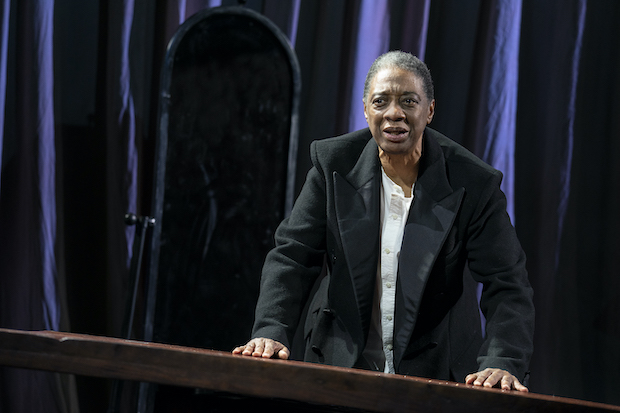
(© Joan Marcus)
This faux-Genesis speechifying seems to infect Berry's performance with artificiality, so that even after her character commits a grisly murder, she seems somewhat jaded by the experience. The audience is weary too, judging by all the nodded heads in the house, and the faint hum of snoring that is surely not one of Rothenberg's sound cues.
Personally, I would rather be scared out of my wits than bored out of them.










